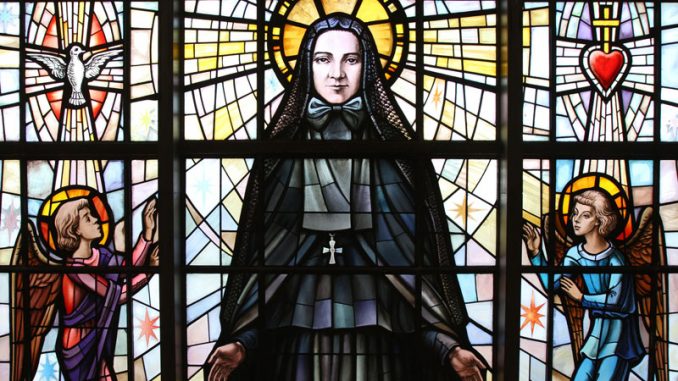
It happened again this past Friday. Every Nov. 13, when the Church remembers St. Frances Xavier Cabrini (Mother Cabrini), I can’t help but recall the time I was deemed a trespasser and asked to leave the property held by some of the sisters she founded.
It may have had something to do with the era and my appearance. I was wearing a tie-dyed T-shirt, bell bottom pants, sandals, and a peace sign hung conspicuously around my neck. My companions were a bearded Mennonite man and an African American woman who tended to wear swirly purple and wooden beads. They were graduate students I had met in my B.C. days (before convent), and we happened to be out for a walk. We had accidentally come upon an attractive large property with an open gate.
Years later, as irony will have it, I visited that same motherhouse on two occasions. One time it was for a meeting of religious sisters from a number of communities. The other time it was for a visit with one of our sisters who was temporarily residing there. By that time, the sister who had ordered my trio off the property was likely enjoying eternal rest. She had been elderly, after all — elderly being a term I now reserve for anyone who seems to be at least two decades older than I am at the moment.
As I consider this memory, I find myself reflecting on two themes that sometimes can lead us into conflict. One is our contemporary need for heightened security in all kinds of settings. The other is our Christian call to hospitality.
As far as security is concerned, there is good reason why we now have vigilant ushers remaining in the back of our churches and, on occasion, off-duty police keeping an eye out as we gather. We also remind parents that they should not let their children leave the body of the church unattended while Mass or other devotions are going on.
We insist on running background checks and providing safe environment training not only for church personnel but also for volunteers and anyone with periodic access to our children, youth, and vulnerable seniors. We equip our schools with double door entry, and many of our schools and offices now have bullet proof glass protecting staff. We hold lockdown drills and have code words to alert teachers and staff.
No one should need an explanation as to why religious institutions have had to take these steps.
And now, as the coronavirus pandemic continues, we are reminded that the virtue of prudence demands that we mask, wash hands, refrain from risky behavior, and obey the scriptural injunction to “Choose Life” as we continue to do more shopping online, attend or conduct meetings from our laptops, and elect drive-through options for banking and eating, continue to livestream Masses, limit our in-person get-togethers, and so on.
At the same time, we have to balance these important precautions with a sense of charity and with a willingness to welcome the stranger. Our parishes have found ways to gather people with safe distancing and to provide services with some new protocols. The outreach centers across our state have continued to feed people and have taken reasonable precautions about meeting with people who need utility and prescription assistance, and they are making a variety of goods and services available to them.
This year the St. Francis Center on St. Helena Island is doing a two-day Christmas toy delivery instead of its typically festive, crowded one. Families who have registered in advance will drive up in whatever vehicle they can access, our local Santa will meet and greet them, and a small group of masked adult elves will smile with their eyes and offer a “God bless all of you and Merry Christmas” to everyone.
That’s the balance. We attempt to keep people safe, but we don’t quarantine ourselves from life or human need. And, to date, we haven’t challenged anyone who has come to our facilities seeking help just because we have never seen them before.
I don’t really fault that elderly sister.
In my religious community, we have also had at least one or two who were over-protective of our property and services and tended to be more suspicious than welcoming. But Mother Cabrini had the balance. She provided safe and secure orphanages, schools, social service centers, and hospitals — most often for poor immigrants.
Meanwhile, she also established healthful residences for her sisters, the many women and girls who followed her inspiration and charism. Mother Cabrini also knew that the Gospel prohibited her from being overly cautious and self-protective.
As a young woman she had been labeled frail and could simply have stayed home in Lombardy taking care of herself. Because she followed the call of Christ, she somehow managed to make a massive impact in the Americas and Europe and to live to be 67 years old, done in not by her poor constitution but by dysentery.
Somewhere along the way, after my experience of being thrown off the convent property, I realized that it made more sense — and would make much more difference — if I were to follow the lead of Mother Cabrini, renounce my ambitions of being a counter-cultural coffee house poet, and become a religious sister.
True enough, there have been some risks and some dubious situations in which I have found myself. But there is also that sense that the Lord, who extended His arms to all of us, wants us to balance our reasonable precautions with exuberant warmth.

